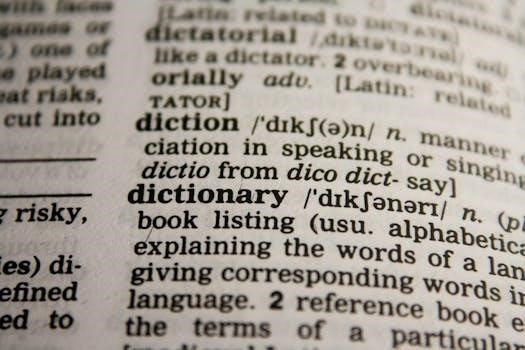
-
By:
- elizabeth
- No comment
8th grade vocabulary words pdf
8th Grade Vocabulary Words PDF⁚ A Comprehensive Guide
This guide provides comprehensive vocabulary lists for 8th grade, aiding reading comprehension, writing skills, and standardized test preparation. It offers resources, activities, and strategies to enhance vocabulary acquisition and usage. Access printable PDF lists for convenient learning.
Importance of Vocabulary in 8th Grade
In 8th grade, a robust vocabulary is crucial for academic success and overall understanding across various subjects. Mastering high-frequency words, especially those encountered in the curriculum, enhances reading comprehension. A strong vocabulary empowers students to tackle complex texts and grasp new concepts more effectively. It allows them to articulate their thoughts with precision and eloquence, improving writing and presentation skills.
Furthermore, a rich vocabulary prepares students for high-stakes tests like the SAT and ACT, where word knowledge is heavily assessed. It also builds a strong foundation for future academic pursuits and professional endeavors. 8th grade is a pivotal year for intellectual challenge; therefore, expanding vocabulary is essential. Students can use word origins, relationships, and context clues to determine meanings.
Ultimately, a strong vocabulary fosters confidence in speaking and writing, empowering students to express themselves clearly and effectively. Regular practice and exposure to new words are essential for building and maintaining a robust vocabulary throughout 8th grade and beyond.
Common Core Standards and Vocabulary

The Common Core State Standards emphasize the importance of vocabulary acquisition for students in grades 6-8. These standards outline specific expectations for students to develop a deep understanding of words and their nuances, enabling them to comprehend complex texts and express themselves effectively.
The standards require students to use context clues, word origins, and word relationships to determine the meaning of unfamiliar words. Furthermore, they should understand specialized vocabulary and precise meanings of grade-level-appropriate words. Students are expected to analyze texts, break them down into components, and identify essential features.
The Common Core Curriculum Maps provide a framework for building a strong foundation in mythology and other areas, enriching students’ vocabulary. By following these standards, educators can ensure that students acquire the necessary vocabulary skills to succeed academically and beyond. The focus is on mastering high-frequency, high-utility words encountered across the curriculum, fostering a lifelong love of learning.
Creating Effective Vocabulary Lists
When constructing vocabulary lists for 8th graders, prioritize words frequently encountered in academic texts and state tests. Analyze student data and commonly taught texts to identify high-utility words crucial for comprehension. Include words that enhance reading, writing, and overall communication skills.
Each entry should feature a clear definition, example sentences illustrating usage, and synonyms to broaden understanding. Incorporate etymological information to reveal word origins and connections. Consider adding antonyms to clarify meaning through contrast. Lists should be tailored to specific subjects and themes to reinforce contextual learning.
Supplement traditional lists with interactive elements like pictures or graphic organizers. Regularly update and expand lists based on student needs and curriculum requirements. Encourage students to actively engage with the words through games, quizzes, and creative writing exercises. This approach ensures effective vocabulary acquisition and retention.
Essential Vocabulary Words for 8th Graders
Eighth-grade students should focus on mastering a range of academic vocabulary crucial for success across subjects. Essential words include those frequently found in literature, science, and social studies texts. Examples are “abet,” meaning to help in a crime, and “beacon,” a guiding light or signal.
Other important terms include “braggart,” someone who boasts, and “cache,” a hidden supply. Students should also understand words like “celestial,” relating to the sky, and “chasten,” meaning to correct or punish. These words expand comprehension and improve communication skills.
Incorporate terms like “concise,” meaning brief and clear, “corroborate,” to confirm, and “despondent,” feeling hopeless. Focus on words that enhance reading comprehension, such as “derive,” to obtain from a source, and “evoke,” to bring to mind. Mastering these essential terms builds a strong vocabulary foundation, improving academic performance.
Vocabulary Resources⁚ PDF Lists and Online Tools
Numerous vocabulary resources are available to support 8th–grade students. Printable PDF lists offer a convenient way to study essential words, often categorized by theme or difficulty level. These lists can be used for self-study, classroom activities, or homework assignments.
Online tools provide interactive learning experiences. Websites like Vocabulary.com offer extensive vocabulary lists, definitions, and practice quizzes. These platforms often include adaptive learning features that adjust to each student’s skill level, ensuring targeted practice.
Additionally, resources like VocabularySpellingCity provide engaging games and activities to reinforce word recognition and usage. These online tools can be integrated into lesson plans or used for independent study, making vocabulary acquisition more interactive and enjoyable. Students can enhance their understanding through context-based exercises and multimedia content.
Utilizing a combination of PDF lists and online tools can create a comprehensive and effective vocabulary learning experience.
Utilizing Vocabulary Games and Activities
Vocabulary acquisition can be significantly enhanced through the integration of games and interactive activities. Engaging 8th graders with vocabulary games transforms learning into an enjoyable experience, fostering better retention and understanding of new words.
Online platforms like VocabularySpellingCity offer a variety of games designed to reinforce vocabulary skills. These games allow students to practice definitions, synonyms, and contextual usage in a fun, competitive environment. Teachers can track student progress and tailor activities to specific learning needs.
Classroom-based activities such as vocabulary charades, word association games, and sentence-building exercises can also be highly effective. These activities encourage active participation and collaborative learning. For instance, students can create their own vocabulary-themed board games or card games.
Vocabulary tests can be gamified by turning them into quizzes with points and rewards. Integrating multimedia elements like videos and images can further enhance engagement. By incorporating these varied games and activities, educators can create a dynamic and effective vocabulary learning environment.
Integrating Vocabulary into Reading and Writing
Seamlessly weaving new vocabulary into reading and writing exercises is crucial for solidifying understanding and promoting practical application. Encourage 8th graders to actively identify and analyze unfamiliar words encountered during reading assignments, utilizing context clues and dictionaries to decipher meanings.
Incorporate these new words into writing tasks, such as essays, stories, and reports, to reinforce their usage. Model effective vocabulary integration through examples and provide feedback on students’ attempts. Encourage students to keep a vocabulary journal, documenting new words, definitions, and example sentences.
Implement activities that require students to use targeted vocabulary in specific contexts. For instance, assign descriptive writing prompts that necessitate the use of newly learned adjectives and adverbs. Challenge students to rewrite passages, substituting simpler words with more sophisticated vocabulary.
Promote peer review sessions where students evaluate each other’s writing for effective vocabulary usage and clarity. By consistently integrating vocabulary into reading and writing, educators can foster a deeper appreciation for language and enhance students’ overall communication skills.

Vocabulary for Standardized Tests (SAT/ACT)
Preparing 8th graders for standardized tests like the SAT and ACT involves targeted vocabulary development. These tests often feature complex words and nuanced language, assessing students’ comprehension and reasoning skills. Introducing relevant vocabulary early on can provide a significant advantage.
Focus on high-frequency words commonly encountered in academic texts and test passages. Utilize resources that compile vocabulary lists specifically designed for standardized test preparation. Encourage students to learn not only the definitions but also the connotations and contextual usage of these words.
Incorporate practice questions and exercises that mimic the format of the vocabulary sections on the SAT and ACT. Emphasize the importance of understanding prefixes, suffixes, and root words to decipher unfamiliar terms. Teach strategies for using context clues to determine the meaning of words in passages.
Encourage students to create flashcards, use online vocabulary learning tools, and engage in regular review sessions. Emphasize the long-term benefits of building a strong vocabulary foundation, not only for standardized tests but also for academic success and effective communication in various contexts.

Grade-Specific Vocabulary Lists (6th-10th)
Understanding grade-specific vocabulary is crucial for academic success. Each grade level, from 6th to 10th, introduces increasingly complex words that students must master to comprehend texts and express themselves effectively. Tailored vocabulary lists cater to the specific reading materials and curriculum demands of each grade.
For 6th graders, the focus is on foundational words that build a solid vocabulary base. 7th grade expands on this foundation, introducing more challenging terms encountered in literature and informational texts. 8th grade vocabulary prepares students for high school, with words that appear frequently on standardized tests.
9th and 10th grade lists delve into advanced vocabulary, including academic and technical terms relevant to various subjects. These lists often include words with Greek and Latin roots, helping students understand the etymology of words and their related meanings. Regularly reviewing and practicing these lists is essential.
Teachers and parents can use grade-specific vocabulary lists to supplement classroom instruction and support students’ learning at home. Online resources, flashcards, and interactive games can make vocabulary acquisition engaging and effective. Encourage students to actively use new words in their writing and speaking.

Building a Strong Vocabulary Foundation
A strong vocabulary foundation is essential for academic success and effective communication. It enhances reading comprehension, improves writing skills, and boosts overall confidence. Starting early and consistently expanding one’s vocabulary provides a significant advantage in all areas of learning.
To build a solid vocabulary base, focus on learning new words regularly. Use context clues, dictionaries, and thesauruses to understand the meanings and nuances of words. Practice using new words in sentences and conversations to reinforce your understanding.
Reading widely is one of the most effective ways to expand your vocabulary. Expose yourself to various genres and authors to encounter a diverse range of words. Pay attention to unfamiliar words and look them up. Keep a vocabulary journal to record new words, their definitions, and example sentences.
Utilize vocabulary-building resources such as flashcards, online games, and apps. Engage in activities that make learning fun and interactive. Participate in word games like Scrabble or crossword puzzles to challenge your vocabulary skills. Consistent effort and a proactive approach are key to building a strong vocabulary foundation.